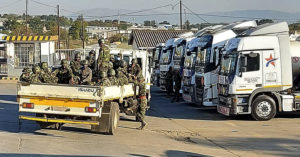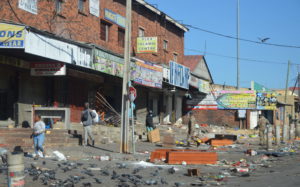By Naledi Sikhakhane
Shopping bags, shoe boxes, rice, potatoes and other goods lie all over the Hammarsdale Junction Mall in Section 5 of Mpumalanga township, also called Hammarsdale, in KwaZulu-Natal. The shopping centre, which is the heart of the township, looks as though it were hit by raging winds. But it was looted by township residents.
A crowd gathered at around 9pm on 11 July and broke into the two supermarkets, Spar and Boxer Superstores. They then worked through the mall, taking anything they could hold and run home with or put in a vehicle. According to eyewitnesses, it looked as though it were 9am the day after payday. The mall was bustling and alive with excitement.
Azak, who preferred not to give his surname, owns a phone repair shop in the centre. He says he is too scared to assess the damage his business incurred. “I have lost all my stock. I am very disappointed. Business was already slow because of Covid-19 but now I am discouraged. I don’t have a way to get my stock back, no insurance, nothing. The people who did this have nothing to lose. I think that’s the reason they act like this,” says Azak.
Protests in KwaZulu-Natal started as part of the #FreeZuma campaign, but morphed into food riots in that province and in Gauteng. After some time, criminals took over, destroying property, including burning malls and factories. In Hammarsdale, smaller tuck shops around the township were also burgled and looted.
Zinzi Mbane*, 29, is an unemployed woman who was part of the looting at the mall and at another shop next to it called the Warehouse.
“The only thing I can tell you is that people are too angry. I just heard that it’s going down at the mall and I started thinking of my needs and went to look for something I can eat, wear or sell. I can’t say it was about Zuma for me but I guess when you don’t have much like a lot of us here, you do what you must to survive, whenever. The Warehouse we kind of knew … during the day that we would go take stuff at night.”
Almost all the important establishments in the township were looted, including the Boxer Superstores at KwaMcoyi, the KwaWebber Centre, the Glodina towel manufacturers, Rainbow Chicken and warehouses for businesses such as Ackermans clothing.
Nombuso Makhanye, who works at Boxer in Section 2 in Hammarsdale, says she is in limbo now that her workplace was burned down. “There was no need for them to burn the shops. They don’t think about the people who work there. As it stands, we don’t know when, and if, we will ever be able to go back to work. I am the sole breadwinner in my family, and I only have experience in supermarkets, so getting a job elsewhere would be nearly impossible as it stands. I feel defeated. They only thought about their needs right now but nothing about the future,” Makhanye says.
Hunger will kill first
According to non-profit group Oxfam, since the Covid-19 pandemic began, vulnerable communities around the world have been sending a clear, urgent and repeated message: “Hunger will kill us before the coronavirus.” Today, deaths from starvation outpace the virus. Eleven people die every minute of hunger, according to a new Oxfam report, which also found the number of those facing famine-like conditions globally has increased six fold over the past year. Unabated conflict, economic disruptions fuelled by the pandemic and the escalating climate crisis have deepened poverty and pushed millions more people to the brink of starvation.
In South Africa, the number of unemployed people is twice the population of eSwatini and Lesotho combined. More than 400 days into the lockdown, a large percentage of the middle class has been pushed into poverty while some of those who were in the informal sector have been forced out of economic activity. Pair that with a divided, unstable leadership and you get surges of sporadic violent outbursts that have been a long time coming. The former president’s arrest was simply the trigger.
Hammarsdale township, one of the conflict hotspots in KwaZulu-Natal, was engulfed in political violence in the late 1980s and early 1990s. These effects still linger. “Hearing a gunshot around here is so normal, we don’t even flinch,” says Makhanye. “This violence can create something that will not stop easily because criminals might take advantage of the chaos.”
The South African National Defence Force has been deployed in parts of KwaZulu-Natal to help the South African Police Service, which was overwhelmed by the riots. “Police are outnumbered here … essentially. The police can’t handle this. It’s too much for them,” says Colonel Fundile Mbhele from the SAPS.
At the time of writing, 26 people had died and 219 had been arrested. The looting and vandalism in KwaZulu-Natal and Gauteng continued into the night of 12 July while President Cyril Ramaphosa addressed the nation. His speech left many feeling he was out of touch with people’s frustrations, especially when he described the violence as “ethnic mobilisation”.
When asked if she thinks the looting will cause even more poverty and strip the community of opportunities, Mbane says, “I’m already poor, sisi. Before and after looks the same to me.”
*Not her real name.
This article was first published by New Frame.


